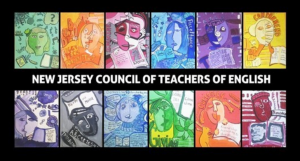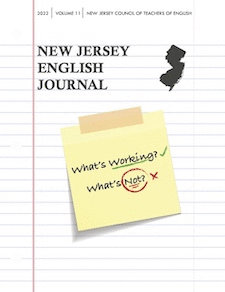by Audrey Fisch and Susan Chenelle
(Originally posted at the Using Informational Text to Teach Literature blog.)
It was very early and very dark when we began our journey to Harrisburg, PA, to present at the Pennsylvania Council of Teachers of English annual conference,
#PCTELA18. Audrey had been to the national affiliate meeting for NCTE, where leaders of all the affiliates gather and share ideas and resources, and met some of the dynamic PCTELA board members, and we were very excited to get to hear the amazing
A.S. King speak, so we knew it would be worth the trip.
It sounded good at the time, but when we had to get up at 4am and drive through NJ and PA in the dark, we began to question why we were doing this! As always, we started to feel energized as we arrived at the conference and left feeling inspired and ready to take on the world (if a little tired). Isn’t that what’s so great about NCTE and the affiliates – how they harness and focus our energies and remind us of the amazing community of educators to which we belong.

We opened our presentation with our newest favorite tech tool,
Mentimeter. We asked our audience the following:
When you think of Gatsby, what words come to mind? Mentimeter did the rest, in real time; how awesome!
We chuckled over “overrated,” bemoaned the “green light” (Audrey’s bugaboo), and noted the presence of “economic inequality,” “privilege,” and “wealth.”
From there, and invoking the conference theme, “The Stories of Our Lives,” we launched into our discussion of
how The Great Gatsby, a text written and set in the 1920s and taught regularly in many, many English classrooms, can be taught as a topical, relevant text that interrogates fundamental issues — past, present, and future — about our culture and beliefs. We explored
key issues in Gatsby – white supremacy and nationalism, the difficulties of economic mobility, economic inequality, anti-Semitism, and the social psychology of privilege and entitlement – and tried to unpack
how to use this canonical text to create space for difficult, critical conversations.
For us, it was fascinating to talk pedagogy with PCTELA members who self-identified as people teaching in the big red state of PA. For both of us, teaching in urban Northern New Jersey, the politics are enormously different. The energy and engagement in the room was palpable; several people interjected mid-session with questions and comments (a presenter’s greatest delight!).
We thought some of the concerns our audience raised and our views on them worth sharing, as we know that teachers across the country, particularly in the redder pockets of our nation, are grappling with how to navigate a tricky political landscape while still ensuring that our classrooms are spaces for:
1. critical thinking about big issues that matter (and not just the green light!);
2. students to think through and contextualize the drama of our particular moment through the context of literature;
3. difficult conversations.
For example, one person at PCTELA asked us whether we were worried about injecting politics into the classroom when, for example, we focus on the white nationalism and economic inequality in Gatsby. Another asked whether we include opposing viewpoints. Still another asked about whether we worried that students would just give us back what we want to hear. These are legitimate, challenging concerns that are worth careful consideration.
Our strategy is two-fold.
First,
we try to think about our work as focused on extracting the politics out of the text(s), rather than injecting our politics. Of course, we focus on things we care about. And so our extraction, our focus, is of necessity going to change based on time and place.
Trump, Kavanaugh,
Roseanne (some of the connections that have recently caught our attention) produce our interest in how the text navigates white nationalism,
fear of non-white immigrants, white male privilege, and the anger and entitlement of those in positions of power.
Reading Gatsby in 2018 is and should be different from reading Gatsby in 1950. Isn’t that, after all, the beauty of literature? Audrey likes to think that if anything makes a text worthy of canonical status, it is that text’s capacity to generate conversation and merit scrutiny in different times and places. (But then again, that may be a function of the reader and an altogether different conversation.)

That said, no one in 2018 can underestimate the trepidation teachers (and students too) feel about these difficult conversations. Yet, as one of our PCTELA audience members asserted, based on his experience teaching at a wealthy, all-male private school with what he described as a mostly Republican student body,
young people are eager to talk about these things. If we open the door and ground our discussion in
Gatsby and companion texts like excerpts from
Lothrop Stoddard, author of
The Rising Tide of Color Against White World Supremacy, (
inspiration for Fitzgerald’s Goddard), or social psychologist Paul Piff’s “Does Money Make You Mean,” an engaging TED Talk about behavioral experiments involving games of monopoly, driving habits, and more, we create space for dialogue in our classroom.

We don’t have to be explicit in discussing Trump or Kavanaugh; for a variety of reasons, we may not be comfortable doing so. But we can frame our discussions of Gatsby and extract the politics from Fitzgerald’s text, so that students have the space and language to think and talk about the big issues that they are seeing all around them. That’s our hope based on our experience, albeit in a very different environment.
After our talk, we had the amazing privilege to hear contemporary young adult author A.S. King address PCTELA.Wow! Her remarks about the importance of young adult literature resonated so strongly with us. King talked about how she couldn’t connect with the four novels (!) she was assigned in the entirety of her high school experience. The Scarlett Letter, she noted, seemed to contain all sorts of issues that should have been meaningful to her, but the Puritans, she admitted, “were a real buzz-kill.” And so she skipped Hawthorne.
S.E. Hinton was another story, for King. (And later, unaccountably, The Satanic Verses.)
Her broader point was that contemporary young adult literature has such an important place in our curriculum, particularly as it keeps young readers reading. King noted sardonically those gatekeepers who say that they don’t believe in contemporary young adult literature and retorted, “it’s not like fairies; it exists.” Indeed. And the passion that so many young readers have for this literature only serves to underscore the importance of our finding ways to make ALL the texts we teach meaningful, relevant, and purposeful for our students.
Our work is cut out for us, especially for those who teach in schools where the curriculum is still dominated by mostly canonical and somewhat inaccessible texts, like Gatsby. But as we tried to show in our presentation, it is precisely Gatsby’s staid canonicity that makes it so full of insurgent and subversive possibilities. This is the work we love, and that so many English teachers do so creatively, ambitiously, and thoughtfully.
So, all in all, an inspiring and impressive PCTELA conference. We left invigorated, and on the way home stopped in Hershey for a tour of Chocolate World (Susan’s first time). Sweet!






 by Susan Chenelle
by Susan Chenelle New Jersey Council of Teachers of English, the New Jersey state affiliate of NCTE, the National Council of Teachers of English
New Jersey Council of Teachers of English, the New Jersey state affiliate of NCTE, the National Council of Teachers of English